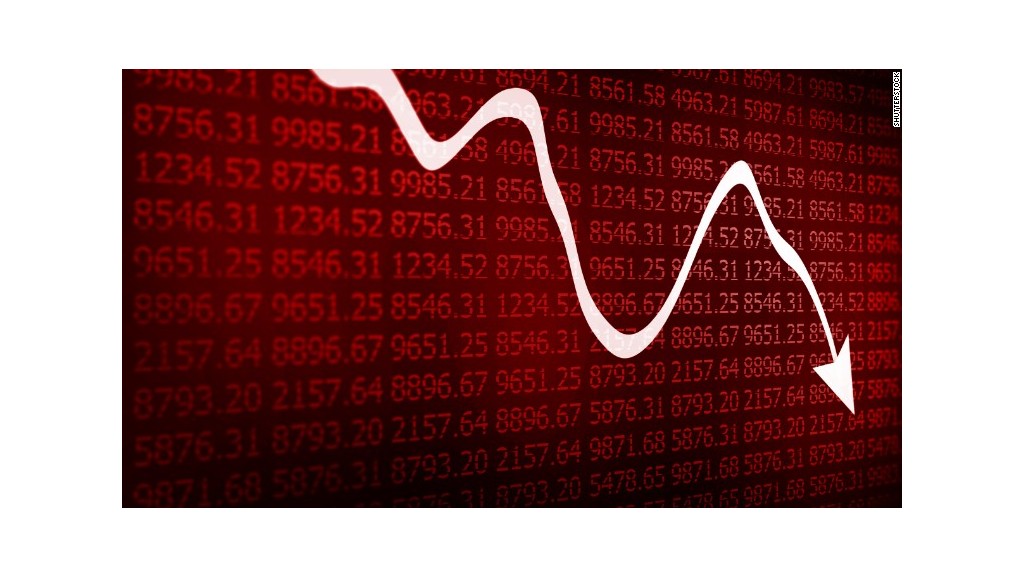
The stock market has been crazier than Miley Ray Cyrus' outfits at the MTV Video Awards.
A 1,000-point Nestea plunge in the Dow Jones Industrial Average last Monday morning followed by a more than 600-point rally a few days later.
The Dow then kicked off September with a 470-point sell-off Tuesday -- before a triple-digit point rebound on Wednesday.
So what should jittery investors do given all this volatility?
Related: Stocks kick off September with a thud
Resist the urge to panic on down days. Yes, this is easier said than done when a look at your 401(k) makes you want to run around like Chicken Little. (The market is falling! The market is falling!)
But now that the Dow, S&P 500 and Nasdaq are all down about 10% from their recent highs -- a so-called correction -- this could be a good time to make some tentative steps back into the market.
"There are now better opportunities for longer-term investors. This correction is not without precedent. You typically get one every few years," said Bill Northey, chief investment officer of the Private Client Group of U.S. Bank.
The last one was a while ago -- the late summer and early fall of 2011.
But this current correction is the third since the bull market began in March 2009. And we had a near-correction for the S&P 500 in 2012. The index fell 9.94% between April 2 and June 1 of that year.
Northey said that corporate earnings would have to get a lot worse in order for the correction to turn into a bear market -- a drop of more than 20% from a peak.
He does not think that's likely given the steady improvement in the U.S. economy. We should get more evidence of that on Friday when the government reports the August employment figures. Economists predict that 210,000 jobs were added last month, according to Briefing.com.
As such, Northey is recommending that investors stick with retailers and other consumer discretionary stocks, techs and health care companies.
Related: August was the worst month for stocks in several years
Robin Anderson, senior economist at Principal Global Investors, also thinks that this recent bout of market volatility is not a sign of impending doom for the economy.
Investors may be obsessed with what's going on in China. But Anderson notes that U.S. exports to China account for less than 1% of America's gross domestic product.
"The U.S. is pretty well insulated from China for now. So the chances of entering a bear market are still pretty slim given that there's a low probability of the U.S. falling into a recession," she said.
So investors shouldn't throw in the towel on stocks yet. Burt White, chief investment officer for LPL Financial, pointed out in a recent note that this correction looks a lot like 1998.
"That year, not unlike today, an Asian currency crisis drove sharp losses overseas and contributed to the S&P 500 being down year to date at the end of August," he wrote.
What happened after that? The market surged in the final four months of the year.
Of course, there is no guarantee that will happen again. Investors should continue to exercise caution.
Related: More volatility rocks China's stock market
Traders are still very anxious -- especially about China and the timing of the Federal Reserve's eventual rate hike.
The VIX (VIX), a key measure of volatility in the market, has surged nearly 150% since the beginning of August. CNNMoney's Fear & Greed Index, which looks at the VIX and six other gauges of investor sentiment, has been in Extreme Fear territory for the past few weeks.
The latest weekly figures from the AAII Sentiment Survey showed that 38% of individual investors surveyed think stocks will fall over the next six months.
This is the fifth week in a row that this level of bearish sentiment was above the survey's historical average of 30%.
Heck, even some pros are advising investors to be more careful.
Bond guru Bill Gross of Janus wrote in his latest monthly outlook on Wednesday that he thinks investors should move to cash or short-term corporate bonds, which he described as being "near cash."
So there are still a lot of skeptics out there. And as long as the bears are growling, the market is likely to keep alternating between gains and losses for the foreseeable future.


